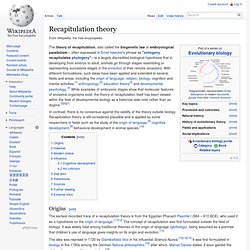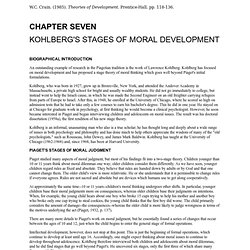

Bad Baby Names - A Boy Named Sue, and a Theory of Names - John Tierney. Kübler-Ross model. The model was first introduced by Swiss-American Psychiatrist Elisabeth Kübler-Ross in her 1969 book, On Death and Dying, and was inspired by her work with terminally ill patients.[1] Motivated by the lack of curriculum in medical schools on the subject of death and dying, Kübler-Ross began a project which examined death and those faced with it while working as an instructor at the University of Chicago's medical school.

Kübler-Ross' project evolved into a series of seminars which, along with patient interviews and previous research became the foundation for her book, and revolutionized how the U.S. medical field takes care of the terminally ill. In the decades since the publication of "On Death and Dying", the Kübler-Ross concept has become largely accepted by the general public; however, its validity has yet to be consistently supported by the majority of research studies that have examined it[citation needed].
Recapitulation theory. The theory of recapitulation, also called the biogenetic law or embryological parallelism— often expressed in Ernst Haeckel's phrase as "ontogeny recapitulates phylogeny"—is a largely discredited biological hypothesis that in developing from embryo to adult, animals go through stages resembling or representing successive stages in the evolution of their remote ancestors.

With different formulations, such ideas have been applied and extended to several fields and areas, including the origin of language, religion, biology, cognition and mental activities,[1] anthropology,[2] education theory[3] and developmental psychology.[4] While examples of embryonic stages show that molecular features of ancestral organisms exist, the theory of recapitulation itself has been viewed within the field of developmental biology as a historical side-note rather than as dogma.[5][6][7] In contrast, there is no consensus against the validity of the theory outside biology. Origins[edit] Haeckel[edit] List of people who have been called a "polymath" Apoptosis. In contrast to necrosis, which is a form of traumatic cell death that results from acute cellular injury, in general apoptosis confers advantages during an organism's lifecycle.

For example, the separation of fingers and toes in a developing human embryo occurs because cells between the digits apoptose. Unlike necrosis, apoptosis produces cell fragments called apoptotic bodies that phagocytic cells are able to engulf and quickly remove before the contents of the cell can spill out onto surrounding cells and cause damage.[5] Research in and around apoptosis has increased substantially since the early 1990s. Forer effect. A related and more general phenomenon is that of subjective validation.[1] Subjective validation occurs when two unrelated or even random events are perceived to be related because a belief, expectation, or hypothesis demands a relationship.

Thus people seek a correspondence between their perception of their personality and the contents of a horoscope. Forer's demonstration[edit] On average, the students rated its accuracy as 4.26 on a scale of 0 (very poor) to 5 (excellent). Only after the ratings were turned in was it revealed that each student had received an identical sketch assembled by Forer from a newsstand astrology book.[2] The sketch contains statements that are vague and general enough to most people. In another study examining the Forer effect, students took the MMPI personality assessment and researchers evaluated their responses.
Flynn effect. Test score increases have been continuous and approximately linear from the earliest years of testing to the present.

For the Raven's Progressive Matrices test, subjects born over a 100-year period were compared in Des Moines, Iowa, and separately in Dumfries, Scotland. Improvements were remarkably consistent across the whole period, in both countries.[1] This effect of an apparent increase in IQ has also been observed in various other parts of the world, though the rates of increase vary.[2] There are numerous proposed explanations of the Flynn effect, as well as some skepticism about its implications.
Similar improvements have been reported for other cognitions such as semantic and episodic memory.[3] Recent research suggests that the Flynn effect may have ended in at least a few developed nations, possibly allowing national differences in IQ scores[4] to diminish if the Flynn effect continues in nations with lower average national IQs.[5] Kohlberg's Moral Stages.
W.C.

Crain. (1985). Theories of Development. Prentice-Hall. pp. 118-136. Piaget's theory of cognitive development. Piaget's theory of cognitive development is a comprehensive theory about the nature and development of human intelligence, first developed by Swiss developmental psychologist Jean Piaget (1896–1980).

It is primarily known as a developmental stage theory but, in fact, it deals with the nature of knowledge itself and how humans come gradually to acquire, construct, and use it. To Piaget, cognitive development was a progressive reorganization of mental processes as a result of biological maturation and environmental experience. Accordingly, children construct an understanding of the world around them, then experience discrepancies between what they already know and what they discover in their environment.[1] Moreover, Piaget claimed the idea that cognitive development is at the center of human organism, and language is contingent on cognitive development.